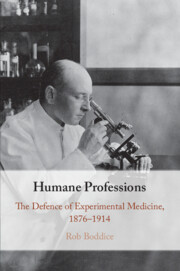Book contents
- Humane Professions
- Humane Professions
- Copyright page
- Dedication
- Contents
- Illustrations
- Acknowledgements
- Introduction: Experior
- 1 Darwin’s Compromise
- 2 Medical Monsters?
- 3 Of Laboratories and Legislatures
- 4 Paget’s Public
- 5 Cannon Fire
- Epilogue: Humanity and Human Experimentation
- Select Bibliography
- Index
Epilogue: Humanity and Human Experimentation
Published online by Cambridge University Press: 22 January 2021
- Humane Professions
- Humane Professions
- Copyright page
- Dedication
- Contents
- Illustrations
- Acknowledgements
- Introduction: Experior
- 1 Darwin’s Compromise
- 2 Medical Monsters?
- 3 Of Laboratories and Legislatures
- 4 Paget’s Public
- 5 Cannon Fire
- Epilogue: Humanity and Human Experimentation
- Select Bibliography
- Index
Summary
War also shifted the ground of experiment inexorably towards the human itself. The political reality that emerged after it, and the increasing extent to which national governments co-opted scientific research under secretive and ultimately military ends, meant that, all the arguments against it notwithstanding, experimental medicine significantly shifted its gaze from the animal to the human. Not only did this betray two generations of fierce rhetoric from within the medical establishment about the intrinsic humanity of medical research, which lent itself all too readily to the logic of military research into the doing of harm, but it also undermined other key arguments. Medical scientists had claimed time and again that animal experimentation was not a gateway to human experimentation, but there can be no question that two generations’ worth of lessons in physiology, bacteriology, toxicology and so on were directly applied to experiments on humans.
- Type
- Chapter
- Information
- Humane ProfessionsThe Defence of Experimental Medicine, 1876–1914, pp. 175 - 185Publisher: Cambridge University PressPrint publication year: 2021

